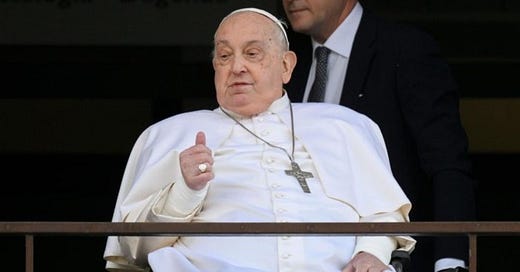Unless Pope Francis has been praying to Martin Luther for five weeks before his release from Rome’s Gemelli Hospital, an extension for his reform movement is unlikely to raise cheers from the faithful. To be sure, if he wants to host more Synods on Synodality or encourage the laity to rebel against liberalizing cardinals or worldly archbishops, some might think a Lutheresque extension for him could help millions.
Notwithstanding, few see that on the horizon. The Pope who has supported numerous modernizing reforms (such as women possibly serving in the diaconate and more acceptance of LGBTQ unions) most likely views his recent victory over bilateral pneumonia as providing a new lease on life for at least three more years.
A week ago, he announced that he would not be stepping aside (as Benedict had) and that he was renewed in his interest in furthering reform. Many observant Catholics groaned although they couldn’t say so. If Pope Francis has his way for three more years, there will be accelerated agitation for modernization, culminating in a large conference planned for 2028. Spun as helping to push the “renewal of the Church toward a new missionary impulse,” this reform will probably move further away from received traditions in favor of accommodation to unbelief.
All this leads one to ask: is it really a good idea to have the church conform more to the world? See Romans 12:1.
Moreover, haven’t Protestants flirted with the same idea and with entirely predictable outcomes? The decline of liberal Protestantism is one of the largest stories of the last hundred years—not only in America but everywhere. And much of that stemmed from the church following the world.
It is not hard to recall the many efforts of Protestants to conform the church to the world over the past centuries. Today, some timid conservatives fear that their communion will die off if they do not tailor themselves more closely to the culture. Yet, some of the most vital segments of Christian renewal are among the conservative Roman Catholics, Anglicans, and others who have discovered the richness of biblical liturgy and ancient confessions.
British philosopher Michael Oakeshott once observed while discussing tradition that “not all innovation is, in fact, improvement . . . to innovate without improving is either designed or inadvertent folly. Moreover, even when an innovation commends itself as a convincing improvement, [the conservative] will look twice at its claims before accepting them.”[1] He continued to note that “the disruption entailed has always to be set against the benefit anticipated.”[2] To be conservative, then, he averred is to “prefer the familiar to the unknown, to prefer the tried to the untried, fact to mystery, the actual to the possible, the limited to the unbounded, the near to the distant, the sufficient to the superabundant, the convenient to the perfect, present laughter to utopian bliss. . . . to acquire and to enlarge will be less important than to keep, to cultivate and to enjoy; the grief of loss will be more acute than the excitement of novelty or promise.”[3]
A church with a living membership, a clear and meaningful liturgy, doctrinal fidelity, and leadership which sincerely promotes that doctrine, worship, and fellowship will live—likely even thrive.
As Jesus told Peter: Flesh and blood have not revealed this to you, Simon Son of Joseph . . . and upon this rock, the gates of hell will not prevail against the church. The church can only destroy herself if she ushers secularism into her courts by turning her once-protective gates into worldly turnstiles which give free reign to the norms, thought, and practices of this adulterous generation.
Maybe we need church leaders who stand athwart the gates, shouting “No, No, No; don’t do it. Don’t go along with the world.” For “he who is friends with the world,” as James wrote, “is at enmity with God.” That’s the kind of reform that is needed.
Virgil Walker summarized the choices in a tweet this week: “The early church wasn’t relevant—it was radical. They turned the world upside down (Acts 17:6). The Puritans saw the church as a training ground for warriors. Today, most churches look like country clubs for the comfortable.”
Over a century ago, G. K. Chesterton, in his Orthodoxy, noted: “Tradition may be defined as an extension of the franchise. Tradition means giving votes to the most obscure of all classes, our ancestors. It is the democracy of the dead. Tradition refuses to submit to the small and arrogant oligarchy of those who merely happen to be walking about.” Chesterton further observed “an imbecile habit . . . in modern controversy of saying that such and such a creed can be held in one age but cannot be held in another. Some dogma, we are told, was credible in the twelfth century, but is not credible in the twentieth. You might as well say that a certain philosophy can be believed on Mondays, but cannot be believed on Tuesdays.” (Orthodoxy, 134)
It takes courage, confidence, and persistence for church reform. We should pray for such, especially since Protestants don’t exactly have a great recent history in that area.
Moreover, it would be a joyful season to see leaders—whether in education, finance, politics, law, or the arts—advocate more abiding truths than the fads of the day.
[1] Michael Oakeshott, “On Being Conservative,” in Rationalism in Politics and Other Essays, 2nd edition (Liberty Fund: Indianapolis, 1991), 204.
[2] Oakeshott, “On Being Conservative,” 205.
[3] Oakeshott, “On Being Conservative,” 203–204.




"Unless Pope Francis has been praying to Martin Luther".......huh? What's your point?
Who's asking? Crush Limbraw - www.crushlimbraw.com - government-religion-politics-culture.